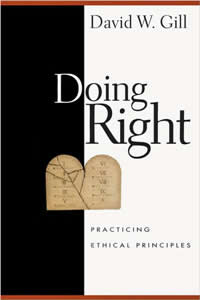Book Notes
 David W. Gill, Doing Right: Practicing Ethical Principles (Downers Grove, Illinois: InterVarsity Press, 2004).
David W. Gill, Doing Right: Practicing Ethical Principles (Downers Grove, Illinois: InterVarsity Press, 2004).
A review by Scot McKnight, Ph.D., Karl A. Olsson Professor in Religious Studies, North Park University. This review appreared in the Covenant Companion, the monthly magazine of the Evangelical Covenant Church.
In this witty, insightful follow-up of his previous book, Becoming Good: Building Moral Character (2000), David Gill, former professor of philosophy and ethics at North Park University, provides for pastors as well as lay persons a wise study of the Ten Commandments.
It is refreshing to see someone take up the task of describing biblical ethics by going straight to the source itself: Exodus 20 and Deuteronomy 5. It is becoming a regularly-observed feature of historical studies about Judaism and Jesus that Jews of the ancient world began their day and ended their day with the sacred rhythm of reciting the Shema (“Hear O Israel…” from Deut. 6:4–5), the Ten Commandments (notice how Jesus connects the two in Matt. 22:18–19), and a litany of prayer requests called Ha-Tepillah. This historical conclusion only strengthens the need for a book like Doing Right.
And, the historic studies of the Ten Commandments (such as Luther’s) as well as French seminal studies, and more recent commentaries, have been mined and richly quoted throughout the text. The one who uses Doing Right will be exposed to a history of comments on the Ten Commandments.
Gill begins Doing Right by exploring the analogy of maps and our need of them with the Ten Commandments as a map for life. But, contrary to what perhaps many of us grew up with, the Ten Commandments are not simply a list of things to do and not to do, but instead they are what Gill calls “area principles.” “Cover” principles are rules or moral claims that “cover” all of life — and Gill sees four such principles: loving God, loving others, pursuing justice, and freedom. “Area” principles make “cover” principles concrete, relevant and practical. The Ten Commandments are “area” principles.
What is perhaps most exciting about Doing Right is that Gill explores the Ten Commandments through the lens of how each one of them makes the four “cover” principles concrete. Those who study the Ten Commandments through these four principles will find they have learned more about the commandment, and will find more inherent value in each commandment, than any who studies each as simply rules and laws to be obeyed. Put simply, Gill explores how the commandment to honor one’s father and mother expresses love for God, love for others, justice and freedom.
I recommend this book for junior high and high school Sunday School teachers, for Bible study groups, and for lay persons who know it is time to return to the source of Christian ethics.


